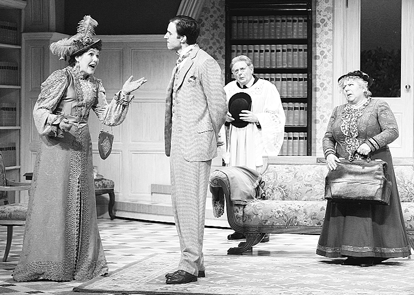Standing, and sitting out, the test of time
Is there any phrase more freighted than “a classic of the international stage?” Doubtful. Oscar Wilde’s iconic comedy, “The Importance of Being Earnest” is exactly that. Predictable in every way and entertaining enough, director Peter Hall and his company The Theater Royal Bath have given Wilde’s play the kind of “Earnest” production that would be right at home in any repertory theater and that would make the ideal field trip for a high school class.
There’s nothing particularly wrong with that; perhaps it’s unavoidable with this play. Part of the pleasure is hearing Wilde’s familiar and famously incisive social commentary and deliciously mannered comedy. You could do a lot worse than spend your time and money on this show.
Lynn Redgrave as Lady Bracknell is the production’s primary calling card. Redgrave is delightful as the classically cranky and class-obsessed Peer of the Realm. She wrests every laugh from the part with a kind of easy fluidity and appealing, sophisticated charm that have become the hallmarks of her mature work. Robert Petkoff is charming as the feckless Algernon Moncreiff. James Waterston, who is becoming a quite dependable comic actor, is brittle and over-strung as James Worthing, unraveling deliciously beneath the social veneer.
Bianca Amato is more than usually forceful as Gwendolyn, and it works quite well in the balance of the characters. Charlotte Parry is a softer counterpoint as Cecily, and the two of them together provide ample support for Wilde’s contention that even in an ostensibly masculine society, the women run the show. Miriam Margolyes makes the pivotal, though dimunitive, role of Miss Prism her own with a comic passion that’s quite unique.
The sets are lackluster, and shoehorned into the Harvey Theater with its large thrust, the entire production is distant from the audience. It reinforces the feeling of this production—solid entertainment but just too far away to be really compelling.
Roundabout’s production of “The Threepenny Opera” is, ironically, perfect for the world of reality television. Harsh, mean, focused almost entirely on presentation and overly and superficially sexualized, the production is quite something to look at and has isolated moments of brilliance. At the same time, largely due to Wallace Shawn’s clumsy new translation, the world of Bertolt Brecht and Kurt Weill lacks any of the focus needed to convey the satire of a corrupt and bourgeois society on the brink of self-destruction.
Nonetheless, theater demands to be seen and interpreted in the context of the present, and the notion that vanity, sex, and selfish pleasure are rending the fabric of human society is intriguing. If our ability to communicate has become so debased that all we have left is vulgarity and animalistic urges, order and perhaps even civilization are on their last legs, indeed.
However, Scott Elliott’s production achieves this level of interest only in hindsight. What’s on the stage is rambling, chaotic, and often unfocused. The characters are left to fend for themselves, and while the staging is often artful—with supertitles, neon signs, and exciting costumes by Isaac Mizrahi—and the visual division of space dramatic, it is too fragmented and not enough to conjure up the amoral world of the criminal Macheath, the prostitute Jenny, and the two women Macheath loves—one, Polly Peachum, a bourgeois girl smitten by Macheath’s bad boy image, and the other an earthy woman of the streets, Lucy Brown.
Elliott and Shawn have missed the point for a modern “Threepenny”—sex and even perversion have become commonplace. One, therefore, experiences this production with a blasé, voyeuristic interest, as one might peruse Internet pornography, but because Elliott has created no moral context for this world, the literary function served by Mrs. Peachum and her daughter Polly, there are no intimations of deeper corruption going on. As a result, there is no artistic substance for a world on the brink, no overriding intelligence, political position and, ultimately, no dramatic tension.
Brecht and Weill cried out against the comfort and complacency that blind a society to its peril and unleash all matter of evil from venality to violence. It’s not here. In fact, Roundabout seems to be doing quite the opposite in celebrating the superficial world—Alan Cumming, who plays Macheath, has a line of cosmetics that are for sale in the lobby. This is either or the consummate satire, or proof that the world Brecht railed against has won.
Cumming, who returns to Studio 54 where he last played the Emcee in “Cabaret,” gives an uncharacteristically disconnected performance in the role of Macheath. In a Mohawk and largely bare-chested, he seems to be clueless about what he’s doing. His acting is uneven and indicates Macheath’s carnality rather than embodying it. He has a scene in a prison cell that lets him chew the scenery but it feels false.
The women fare better, but as with Cumming, it is as if Elliott has just let them do their thing and so we rely on talent and charisma, which makes this whole enterprise feel more like a staged reading than a full-on production. Cyndi Lauper gives a compelling performance as Jenny. Her idiosyncratic and wonderful voice has acquired a richness with time without losing any of its honesty and immediacy, and of all the actors, she seems most connected to the substance of her character.
Ana Gasteyer is a force of nature as Mrs. Peachum. With direction, she could be truly great. She’s got the instrument and the presence of a star. Nellie McKay as Polly likewise has a fantastic voice, but she needs direction in order to become a believable human on the stage.
I kept thinking that with all this talent on the stage, they could have done so much more. It’s depressing, and not in that theatrically romanticized, “Weltschmerz,” Brechtian way, but in the “I just wasted a night in the theater” way.
gaycitynews.com



































